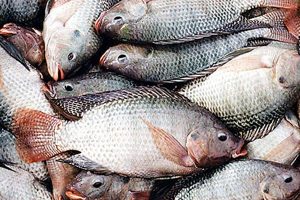Nigerians may be unaware, but genetically improved tilapias are on the way to the country and should arrive this month, May 2022.

According to reports, the improved tilapia is to be introduced following “an inclusive legal agreement” between WorldFish and Premium Aquaculture Limited through a programme on Genetically Improved Farmed Tilapia (GIFT).
A report from the Nigerian Investment Promotion Commission reveals: “This agreement will augur the establishment of a GIFT-based aquaculture industry in Nigeria. Bill and Melinda Gates Foundation (BMGF) and the United States Agency for International Development (USAID) are collaborating with WorldFish and PAL on this endeavor with the aim of having WorldFish/PAL GIFT tilapia in Nigerian fish markets by late 2023.”
The genes used to improve the tilapia could have come from a variety of organisms, including other fish, coral, mice, bacteria, or even humans. They are basically produced to suit industrial aquaculture models with doubtful regard for possible ecological, environmental concerns.
FishNet Alliance, a network of fishers in several African countries, is concerned that apart from the environmental and health challenges, it is unclear which agencies of government have had a hand in this transaction.
“Improved tilapia will not tackle the root cause of challenges in the fisheries sector in Nigeria. Neither will it solve the hunger and malnutrition problems in the country,” stated Stephen Oduware, coordinator of the FishNet Alliance.
“The issues affecting the Nigerian fisheries sector namely: pollution due to oil and gas and other minerals exploration and exploitation; insecurity and piracy; illegal, unreported and unregulated fishing activities of national and international trawlers – leading to overfishing of both target and non-target species of fish; destruction of the mangrove forests amongst other issues – are matters that government should focus attention on,” Oduware added.
Fish farming in Nigeria is done mostly close to the river or in the creeks and there are fears that there could be interactions between the “genetically improved” fish and the relatives in the wild. If such fish were genetically engineered, research has shown that releasing as little as 60 fish into a wild population of 60,000 would lead to the extinction of the wild population in less than 40 fish generations. The implication of having genetically improved tilapia released into the wild is not known.
A new study has found that genetically engineered (genetically modified or GM) zebrafish (Danio rerio) have escaped from fish farms in Brazil and are multiplying in creeks in Brazil. Researchers say that their results “confirm that escapes from aquaculture facilities are common and could bring severe consequences to local fish populations including endemic, rare, and threatened species.” They conclude that the production of non-native species should be avoided, and transgenic fish should be banned.
“The escape of GM fish from Brazil should be a big wake-up call for our Nigerian regulators and government,” says Mariann Bassey-Orovwuje, coordinator of the Food Sovereignty Programme with Friends of the Earth Nigeria and Africa.
In 2020 Friends of the Earth USA released an updated list of 80 grocery retailers, seafood companies, food service companies and restaurants with more than 18,000 locations nationwide that have stated that they will not sell genetically engineered salmon, demonstrating a widespread market rejection of the first commercial offerings of the first genetically engineered animal approved for human consumption in the U.S.
Groups such as HOMEF and ERA/ FoEN, GM Free Nigeria that are concerned about genetically engineered organisms in the country have consistently complained about the weak nature of biosafety regulatory framework in the country. They have also called for increased transparency, accountability and public engagement before considering approving new life forms into our environment and biodiversity.
Reacting to the news of genetically improved tilapia on the way to Nigeria, the director of Health of Mother Earth Foundation (HOMEF), Nnimmo Bassey, cautioned: “The Nigerian environment is already bedeviled with many genetically engineered crops and products of which farmers and consumers are not aware of. We are concerned that the introduction of genetically improved tilapia may be a step towards the introduction of genetically engineered fish into the country. Moreover, we are not aware that there was consultation with majority fishers and consumers in the country before the so-called inclusive agreement that opened the door for this tilapia specie was signed.”
As stakeholders concerned with the wellbeing of our aquatic ecosystems, FishNet Alliance says it sees the genetically improved tilapia as potentially having adverse effects on food system and on the livelihoods of millions of fisherfolks and processors.
“We also call on our government to put a stop to approvals of genetically modified fish, animals, or plants in Nigeria until the biosafety regulatory system is strengthened and tightened. We also demand that in all cases public participation should be mandatory to ensure transparency and the Precautionary Principle should be adhered to strictly in all cases.”
FishNet Alliance calls on the Nigerian government to provide resources to public fisheries and oceanography institutions for healthy management of our aquatic ecosystems and resources rather than opening the gates for novel varieties, coming under the guise of philanthropy that may negatively affect our food systems.
“We hope that the genetically improved tilapia will not be used as an opening to sneak in genetically engineered fish into our environment and dining tables,” said the group.
